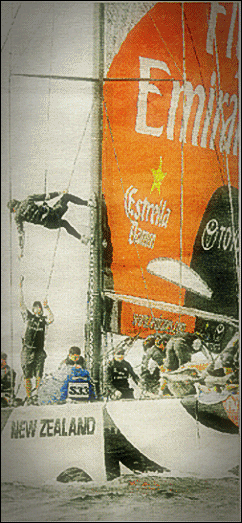Think out of the box
Dato' Dzulkifli Abd Razak
Article
New Sunday Times - 09/18/2005
WHAT has the monsoon and economy in common? Probably not much, except in a negative way.
During the monsoon season, many economic activities are affected. For example, it would be too risky for fishermen to go out to sea. For the tourist, it may be too wet to venture outside while for the Malaysian man in the street, it will be just too inconvenient.
Consequently, many accept this situation and do little to change it. This is a good example of conventional or "inside-the-box" kind of thinking.
This type of thinking is very common, especially with those who want to play it safe. And there are plenty of them around.
On the other hand, there are those who like to question such conventional wisdom. How about having a yacht race during the monsoon season?

How about making it an international race at par with races in countries like Sweden, New Zealand and Australia, to name a few?
How about calling it The Monsoon Cup, Malaysia’s own Formula One version of yachting?
Better still, have it is included in the Swedish Match Tour.
This kind of thinking is creative or out-of-the-box type of thinking.
Thinking of this kind, however, is a bit rare, prevalent only among those who dare to rock the boat and take risks.
Sadly, there are not too many of them around. Hence, stereotype thinking abounds.
Yet, creative thinking should be the order of the day. Some management gurus put it rather bluntly: Be innovative or be dead. It could not have been said better.
In other words, by being creative, what is often regarded as negative can be turned on its head into something positive.
All it needs is a bold innovative thinker, someone who has the passion of turning novel ideas into reality.
And hence an agreement was signed recently for Terengganu to be a venue of the Swedish Match Tour, the world’s premier yachting series. Pulau Duyung, off Terengganu, noted for its quality tradition of boat-making, will host the Monsoon Cup, scheduled to be held in late November and December.
The Monsoon Cup is the brainchild of the Prime Minister who reportedly mooted the idea during a fishing trip not long after the last election.
Indeed, he has been consistently advocating innovative thinking as a way forward for Malaysia.
Earlier this month, in his keynote address at the Global Leadership Forum, he expounded three vital traits needed to facing global competition — innovation, branding and leadership (NST, Sept 7).
The first two elements are amply illustrated in the elegant example of the Monsoon Cup and the third is the Prime Minister walking the talk.
By acknowledging that "the fear of failure, of trying out new thinking, is a cultural issue", the Prime Minister recognises one difficult barrier that must be dealt with before there can be creativity. And he showed it can be overcome.
"Part of my mission is to gradually nurture a climate which diminishes fear of failure or fear of criticism and which supports creative thinking," he said.
"I want a climate where people with new ideas can be heard and where good ideas can receive the necessary resources for further development."
Such a climate cannot be more important than classrooms, lecture halls and workplaces where Malaysians interact and intermingle daily, where it goes beyond education to change values, mindset and culture.
Last week, the Prime Minister reiterated the need for a reform of the education system to encourage creativity and risk-taking, and adopt a discovery-oriented outlook.
This was part of the 12 recommendations made by the International Advisory Panel (IAP) at the end of the Ninth Multimedia Super Corridor-IAP meeting in Penang last week.
Last year, the Prime Minister had talked about the need for "no less than an education revolution".
One way in which an institution of higher education can face the challenges is by having staff members who have the knowledge to assess both the value of tradition and the need for innovation.
When creatively exploited, connections between different branches of knowledge can result in breakthroughs, creating many new opportunities for innovations.
For this to happen, there has to be institutional autonomy and academic freedom, conditions deemed crucial in the preparation of present generations for the "new" world. This is something which is lacking in our education system.
Thus, it is not strange to read statements like "…universities, research institutions and technology companies must step up efforts to continuously develop talent and act as idea factories.
"Apart from this, universities can act as incubators for budding entrepreneurs in support of national effort to promote research and development, and to intensify innovations."
These are quotes from the Prime Minister in 2003, when he was the No 2.
The idea of hosting The Monsoon Cup, is more of a social innovation rather than a technical one.
Thus, in our drive to make innovation a national advantage, it would be very unwise to be overzealous about science and technology, at the expense of other forms of knowledge, namely the social sciences and humanities.
We are in danger of doing just this when social sciences and humanities are often demeaned as not marketable, implying that it is less important. The irony is that the market too is no more than a social innovation.
